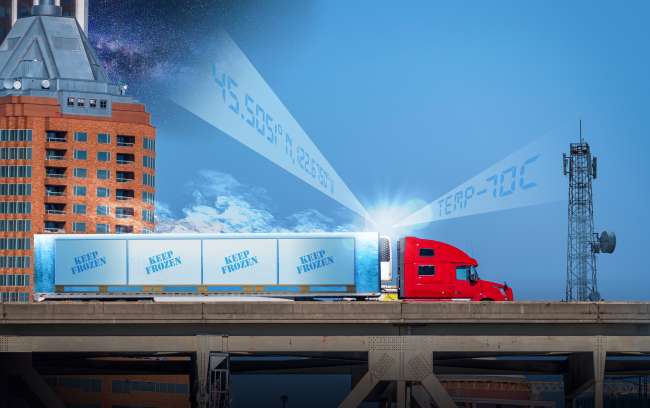5 Reasons Why Cold Chain Monitoring is a Must

With the approval of the first COVID-19 vaccine and the need to move this valuable cargo at temperatures as low as -70°C, a lot of discussions are taking place about temperature management and how the freight transportation industry will address this challenge. But for transportation companies, overcoming logistical challenges is nothing new. Whether transporting pharmaceuticals, food or any other temperature-sensitive cargo, it’s always been imperative for carriers to maintain precise temperature controls throughout the cold chain in order to maintain the integrity of loads.
As pressures mount for the refrigerated transportation industry, fleets are increasingly relying on smart IoT technology to ensure complete visibility of cargo, maintain adequate temperature levels to preserve loads, minimize insurance premiums, streamline handoffs, minimize detention, ensure compliance and more.
Here are five key reasons why comprehensive temperature monitoring and control is paramount when transporting refrigerated loads:
Reduce claims and maintain the integrity of goods
By deploying IoT technology on transportation assets, fleets can benefit from around-the-clock reefer temperature monitoring, automated alarms and two-way controls that enable them to deploy quick corrective measures when an issue is detected. Real-time connectivity with reefers and drivers is key to helping prevent cargo spoilage and minimizing revenue losses due to spoiled loads.
When it comes to protecting high-value refrigerated cargo, carriers are increasingly opting for ultra-reliable, ubiquitous backup satellite to ensure a continuous flow of data from the reefer. Backup satellite keeps fleets connected in areas where the cellular network is unreliable, unavailable or compromised by severe weather, and helps prevent communication lapses that could hinder a carrier’s ability to save a load by quickly responding to a temperature issue.
Improve efficiency
Direct integration with refrigeration units on trailers enables two-way control and the ability to remotely execute reefer functions without engaging the driver. This is key to maintaining steady temperatures throughout the cold chain, but also to ensuring drivers can focus on driving. Two-way control allows dispatch and fleet operators to remotely set and adjust temperature, initiate a pre-cool, switch operating modes, turn a unit on or off and more from a centralized location.
With smart, IoT-enabled reefer tracking devices, carriers also benefit from the ability to streamline the distribution of refrigerated cargo with arrival and departure notifications and the ability to minimize detention and time spent at loading docks.
Improve customer service
Fleets can build customer loyalty by providing cargo owners with shipment visibility so they can accurately predict delivery times, deploy contingency plans when delays are expected, schedule load and unload crews, and speed up the distribution of goods upon arrival.
Make compliance easy
Reefer monitoring solutions can also simplify compliance with food safety regulations such as the Food Safety Modernization Act (FSMA) and meet guidelines that apply to the distribution of pharma products with the continuous collection and retention of temperature data that makes it easy to share proof of temperature records as required.
Increase profitability and reduce fuel costs
Reefer trailer telematics can also optimize asset utilization, turn times, trailer pools and tractor-to-trailer ratios, and minimize detention with comprehensive reports and advanced analytics. And, when it comes to fuel economy, a telematics solution can help you eliminate unnecessary continuous run usage to help you reduce fuel consumption.
A good reefer management solution also allows carriers to track refrigerated trailer usage at a yard. It can track when a reefer was turned on, when cargo doors were opened for loading and how long a reefer was left on while still in the shipping yard.
The importance of intelligent asset tracking for the cold chain cannot be understated. In addition to helping fleets drive better efficiencies, an advanced IoT solution with comprehensive temperature management capabilities is necessary when transporting high-value, sensitive, temperature-controlled cargo. In the coming months, as vaccine distribution ramps up, refrigerated fleets will continue to provide the essential distribution that will help save lives. And, with so much at stake, intelligent cold chain monitoring and control will prove more important than ever.
ORBCOMM (Nasdaq: ORBC) is a leading provider of innovative fleet management solutions for two-way tracking and control of trucks, dry van and refrigerated trailers, containers, chassis, railcars and more. With a dominant market position in transport telematics, ORBCOMM is trusted by the world’s top companies for its broad range of transportation solutions. For more information, please visit www.orbcomm.com.
The above article is sponsor-generated content. To learn more about sponsor-generated content, click here.


